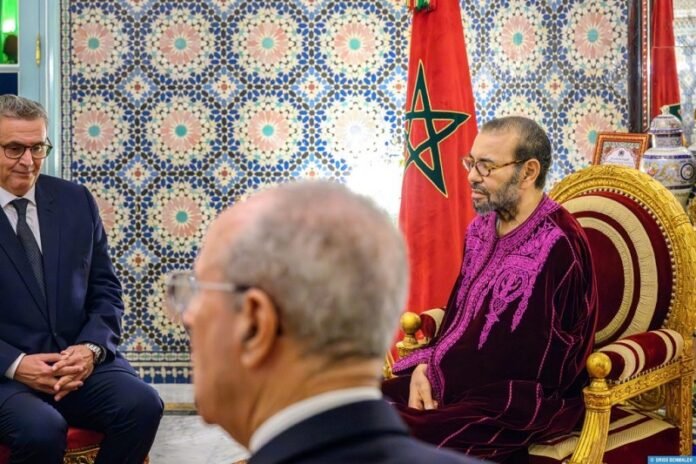In a new step reflecting the royal vision, His Majesty King Mohammed VI, may God protect him, presided over an important working session at the Royal Palace in Casablanca, dedicated to revising the Moroccan Family Code. This session is the culmination of an extensive consultative process that began long ago, aiming to provide a legal framework that keeps pace with Morocco’s social and economic changes while respecting Islamic principles and universal values of justice.
Does this reform meet the aspirations of Moroccan society?
The working session was not merely a transient event but the culmination of a long process of discussions and consultations involving various experts, religious institutions, and civil society. What distinguishes this reform is that it comes after intensive hearings bringing together diverse voices to propose amendments aligned with the reality of Moroccan families, within a framework that respects the country’s cultural specificities while adapting to contemporary transformations. But is this direction enough to keep up with the rapid changes faced by Moroccan families? Can this revision meet modern demands while preserving religious foundations?
A Reform Integrating Sharia and Universal Values
The legal proposals were referred to the Supreme Council of Ulema, where the committee responsible for revising the Code consulted religious scholars who provided jurisprudential opinions based on the principle of “neither prohibiting the permissible nor permitting the forbidden.” Is this principle sufficient to ensure a fair balance between family members’ rights? Can religious rulings evolve alongside social and economic changes, or will they remain confined to traditional interpretations?
Engaging Public Opinion: A Step Towards Citizen Participation
Among the key directives issued by His Majesty the King is the necessity of continuous communication with public opinion regarding the revision through awareness programs and press releases detailing the reform. But will the government succeed in achieving effective engagement with all segments of society? Can citizens understand and accept the new amendments amidst the social and economic disparities affecting Moroccan families?
The Role of Continuous Ijtihad in Institutionalizing Fiqh
The royal directives emphasized establishing a permanent framework for ijtihad on family issues within the structure of the Supreme Council of Ulema. The goal is to address evolving jurisprudential questions consistently, beyond seasonal ijtihad. Will this approach help resolve recurring issues facing Moroccan families, or will it be limited to specific topics without addressing new societal challenges?
Will this Reform Enhance the Stability of Moroccan Families?
Through this reform, His Majesty King Mohammed VI, may God protect him, aims to strengthen the position of Moroccan families and guarantee their rights in light of principles of justice and equality. However, significant questions remain about the impact of these modifications on family stability amidst current economic and social challenges.
In summary, this reform is not just a legal amendment but a significant step toward achieving a balance between authenticity and modernity while preserving religious values and positively impacting Moroccan families’ lives. Will this initiative succeed in achieving the desired balance between religion and modernity? And how will Moroccan families react to this change?
Experiences of Islamic Countries: Lessons Learned
- Tunisia: A Pioneer in Women’s Rights
Since 1956, Tunisia has introduced unprecedented reforms to the Personal Status Code, such as banning polygamy and criminalizing forced marriage. These reforms have improved women’s status but also sparked debates between conservative and reformist currents. How can Morocco balance these opposing tendencies? - Malaysia: Plurality and Integration of Systems
Malaysia’s system combines Islamic law and civil law, offering flexible solutions to family issues. This model is inspiring for ensuring a balance between authenticity and modernity in Morocco while respecting local cultural values. - Indonesia: Flexibility Amid Cultural Diversity
Indonesia serves as an example of applying Sharia while considering cultural and religious diversity. Its Sharia courts demonstrate flexibility in interpretation, helping address complex issues in a diverse society. Can Morocco adopt a similar framework that allows for ijtihad in a modern context?
Towards a Unique Moroccan Model
The Family Code reform marks a historic step aimed at strengthening Moroccan families’ status amidst economic and social transformations. By drawing on Islamic experiences, Morocco could present a unique model combining authenticity and modernity. Will this reform be enough to ensure Moroccan families’ stability? How will these amendments affect women’s and children’s rights and the protection of the family as a whole?
Conclusion
The revision of the Family Code is not merely a legal amendment but a social and cultural project aspiring to strike a fair balance between Islamic values and contemporary demands. With wise royal leadership, Morocco appears poised to enter a new phase, placing the family at the heart of sustainable development.


